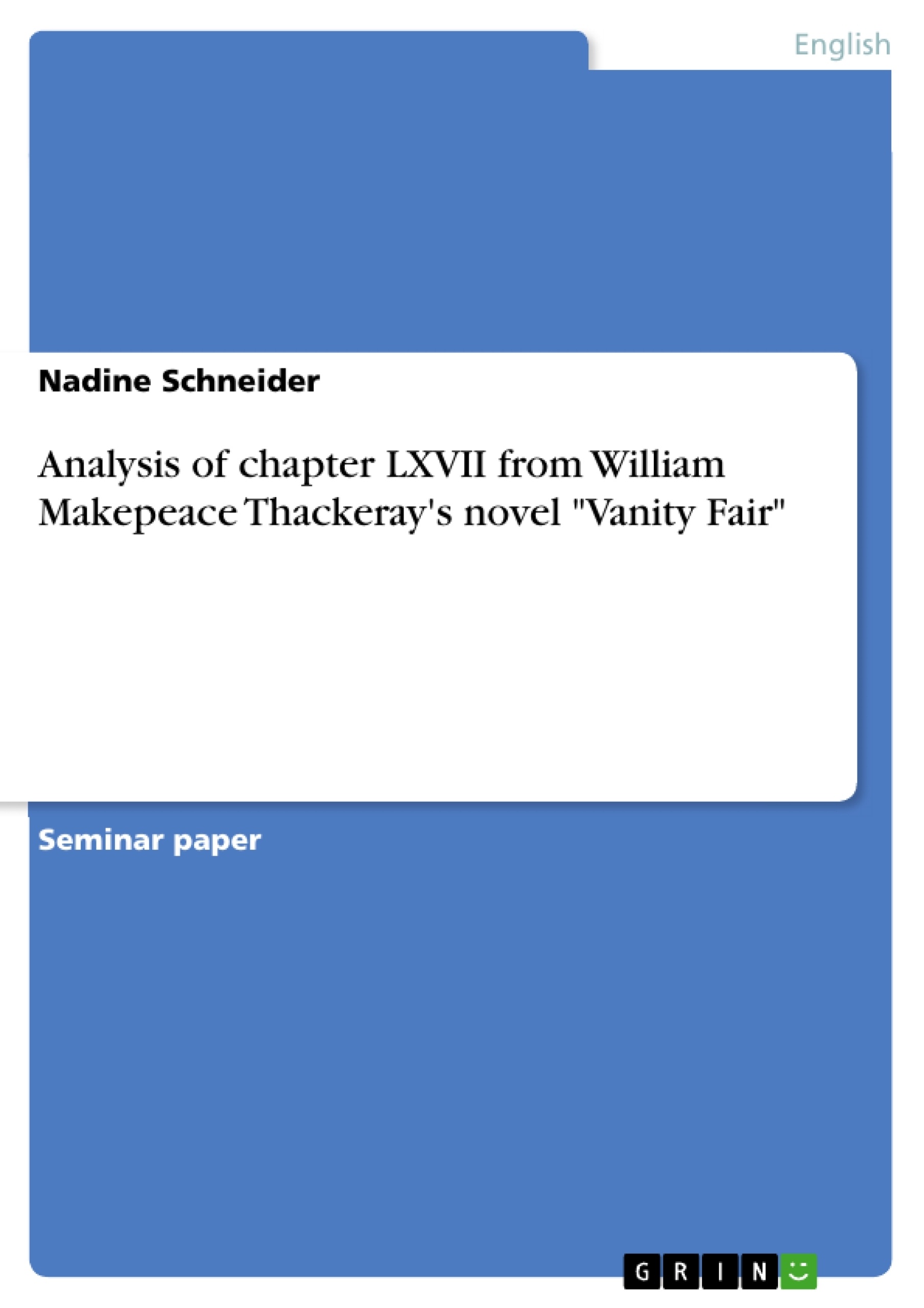Love, money and power – these are the main subjects of William Makepeace Thackeray's "Vanity Fair". The paper concentrates on the novel's very last chapter “Which Contains Births, Marriages, And Deaths” and takes a closer look at the two characters Rebecca and Amelia.
These two women stand as examples for completely different beliefs: Becky only trusts in monetary values, whereas Emmy’s true salvation lies in love and loyalty – but also in religion and faith.
Inhaltsverzeichnis (Table of Contents)
- Introduction: From a thousand thoughts to Vanity Fair
- Brief outline of what happened to Amelia and Rebecca over the years
- Amelia
- Rebecca
- Differences of Amelia and Rebecca in their style of speaking and its consequences
- The irony of the commenting narrator
- Analysis: Parasitism or Women on the hunt for life
Zielsetzung und Themenschwerpunkte (Objectives and Key Themes)
This analysis examines the final chapter of William Makepeace Thackeray's *Vanity Fair*, focusing on the complex characters of Amelia and Rebecca and their contrasting approaches to love, money, and social status. It explores Amelia's enduring affection for William Dobbin, even after her husband's death, and Rebecca's relentless pursuit of wealth and power. The analysis also delves into the nuances of the novel's narrator and the irony embedded within their commentary.
- The contrasting values and motivations of Amelia and Rebecca
- The complexities of love, marriage, and societal expectations in Victorian England
- The role of ambition, social climbing, and wealth in shaping characters' actions
- The narrator's perspective and the irony of the narrative
- The impact of the Napoleonic Wars on the characters' lives
Zusammenfassung der Kapitel (Chapter Summaries)
The analysis focuses on the final chapter of *Vanity Fair*, "Which Contains Births, Marriages, And Deaths," providing insights into the characters' final states and the culmination of their journeys. It examines Amelia's enduring love for William Dobbin, despite her mourning for her late husband, George Osborne. It further explores Rebecca's continued ambition for social advancement, showcasing her relentless pursuit of wealth and status.
Schlüsselwörter (Keywords)
The analysis delves into key themes of *Vanity Fair*, including love, marriage, social status, ambition, wealth, power, and the complexities of human nature. It explores the contrasting values and motivations of the central female characters, Amelia and Rebecca, and the irony embedded within the narrative. The analysis also examines the impact of the Napoleonic Wars on the characters' lives and the influence of Victorian societal expectations.
Frequently Asked Questions
What are the main themes of Thackeray's "Vanity Fair"?
The novel primarily explores subjects of love, money, and power within Victorian society, focusing on social climbing and human nature.
How do Rebecca and Amelia differ in their values?
Becky Sharp focuses on monetary values and social advancement, while Amelia Sedley finds salvation in love, loyalty, and religious faith.
What happens in the final chapter of the novel?
Chapter 67, "Which Contains Births, Marriages, And Deaths," concludes the journeys of the main characters, revealing their final social and emotional states.
What is the role of the narrator in "Vanity Fair"?
The narrator acts as a commenting observer, often using irony to critique the characters' motivations and the vanity of society.
How did the Napoleonic Wars impact the characters?
The wars serve as a backdrop that shapes the characters' fortunes, social standing, and personal losses throughout the novel.
- Citar trabajo
- Nadine Schneider (Autor), 2006, Analysis of chapter LXVII from William Makepeace Thackeray's novel "Vanity Fair", Múnich, GRIN Verlag, https://www.grin.com/document/338122



